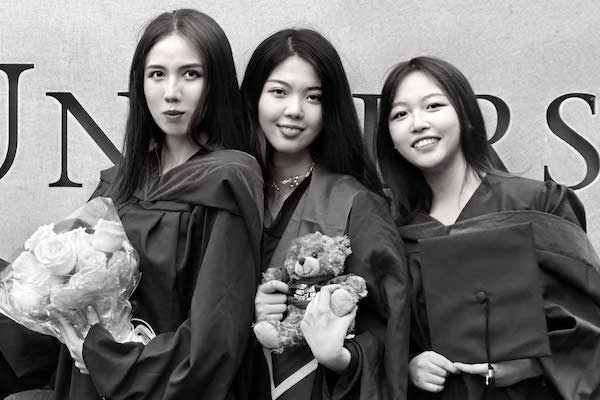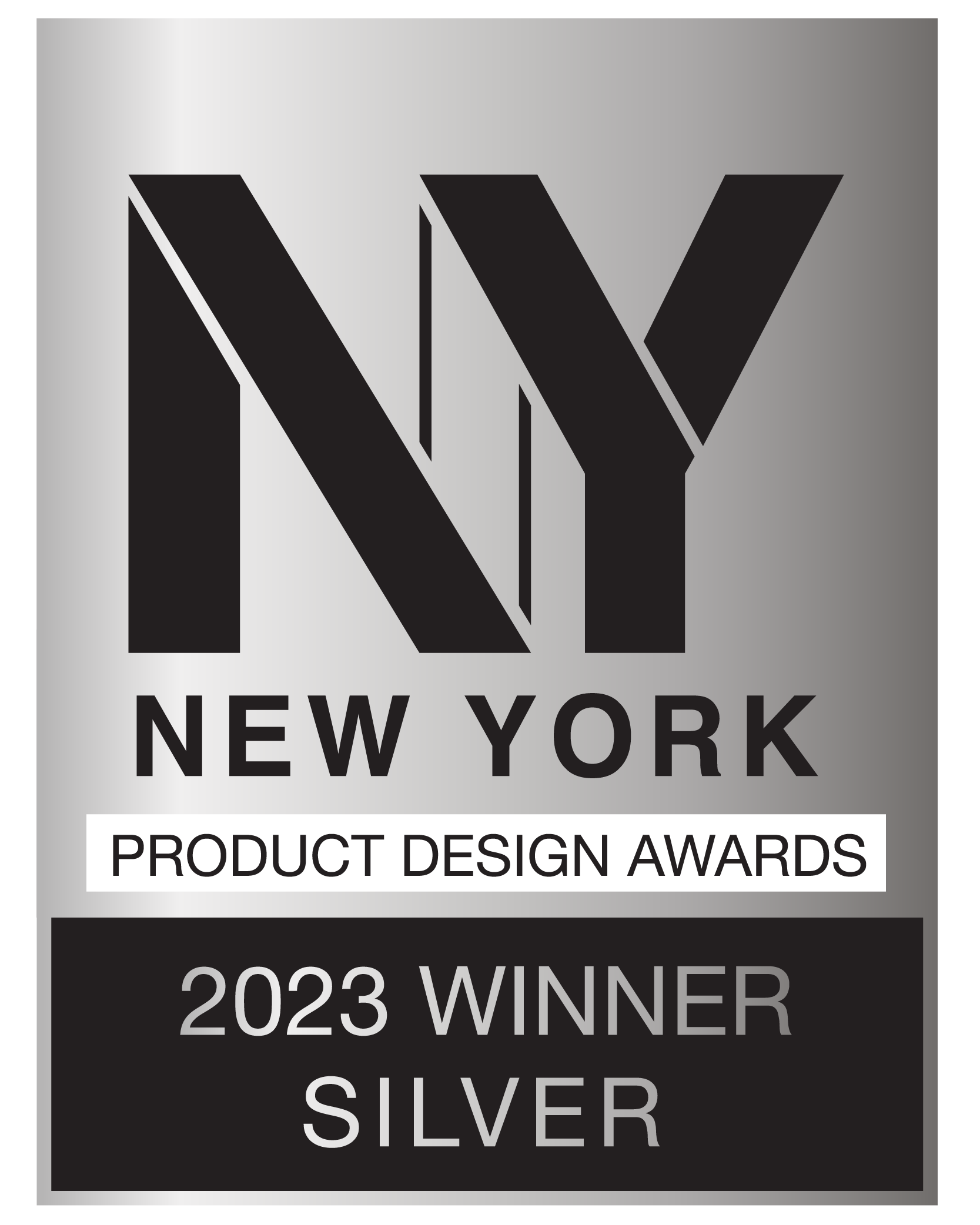
Jinrong Li, Jiayuan Wang, and Yiwei Lin
1. Please give us a brief bio of yourself and your background.
We are Jinrong Li, Jiayuan Wang, and Yiwei Lin, the driving forces behind the Geward design team. Our journey began with a Master's in Design from the University of Pennsylvania, leading us to the realm of user-centered design. With a combined experience of over eight years in various disciplines such as architecture, landscape architecture, urban design, product design, and digital media, we have cultivated a rich and diverse skill set. As UX designers, we excel in merging technology with design to create solutions that are not just visually appealing but also deeply engaging and highly effective.
Our design approach is deeply rooted in empathy, always placing the user at the center of our creative process. We leverage interdisciplinary design thinking to tackle real-world challenges, crafting innovative solutions that are tailored to the users' needs and experiences. Our goal is to make meaningful impacts through design, solving problems with a keen understanding of user perspectives and preferences.
2. What made you become/why did you choose to become a product designer?
Our transition from architecture and landscape design to user-centered design is rooted in environmental understanding and climate action commitment. This has led us to create intuitive, meaningful, and environmentally conscious digital experiences.
In our project Geward, we've integrated social engagement, AI-driven selection, and a rewarding points system, redefining convenience and fun in ordering. This platform emphasizes social engagement, enhancing community connection and sustainability.
Our designs incorporate sustainability and ecological awareness, with Geward exemplifying how social engagement can enrich the user experience and foster community responsibility. We view design as a tool for empowerment, blending aesthetic, functional, and environmentally responsible principles. Our journey involves constant innovation, creating designs that meet user needs and support sustainability and social interactivity.
3. Tell us more about your business/company, job profile, and what you do.
Geward revolutionizes B2C ordering by seamlessly blending social interaction, AI-driven selection, and a rewarding points system.
Our platform redefines convenience and affordability. We're committed to empowering minority merchants with a user-friendly cloud POS system, optimizing operations, implementing dynamic pricing, and fostering customer loyalty.
We design Geward to create a fair ecosystem that uplifts all participants, promoting a sustainable and enjoyable ordering experience for businesses and customers alike.
4. What does “design” mean to you?
To us, design is a dynamic blend of creativity, user-centric solutions, and a strong emphasis on social engagement. It's about crafting experiences that meet user needs and exceed expectations through innovative interactions. Our approach is holistic, focusing on every aspect of the user's experience with our creations, ensuring they are intuitive, meaningful, and socially engaging.
5. What’s your favorite kind of design and why?
As UX designers, our favorite kind of design is one that seamlessly integrates user-centered solutions with a strong focus on social engagement. We derive immense satisfaction from creating designs that cater to users' immediate needs and preferences while fostering a sense of community and interaction.
This approach enables us to craft digital experiences that are not only intuitive and engaging but also deeply connected to social dynamics and interactions.
Our emphasis on social engagement is evident in projects like Geward, a B2C ordering platform that reshapes the way users interact, make selections, and enjoy their experiences. We prioritize features that encourage social interaction and community building, reflecting our ethos of making a positive difference in the world, one user experience at a time. It's this blend of user-centric design and social connectivity that excites us, driving us to create experiences that connect people and enhance their daily interactions.
6. To you, what makes a “good” design?
We believe good design should solve problems and enhance experiences. With Geward, we aim not just to enrich ordering experiences but also to champion a fair and thriving ecosystem that uplifts all participants, reflecting our belief that design is a responsibility to positively impact society, enhancing connections and experiences for users and communities alike.
7. Describe your design style and its main characteristics.
Our design style adheres to the core principle of user experience, comprehensively integrates product positioning and market, and produces coherent, smooth, concise and attractive solutions.
For the Geward product, we combined the characteristics of young people, the main C-end user group, with a simple design of orange and black to highlight the coolness and liveliness, and carefully designed the built-in points system, limited-time promotion system and social system to enhance Its playability. Combined with the busy nature of restaurant managers, we have made the display and operation of the B-side very simple, clear and easy to use.
8. Tell us about your design process.
In the early stages of product development, we conducted in-depth research on the operating needs of many customers - restaurants, and received a large number of cooperation intentions. Based on the research, we selected the core functions of dynamic pricing, AI recommendation, social networking and points to distinguish them from existing applications on the market, and introduced user testing into each round of prototype design. And we have worked closely with engineers to formulate a phased development plan. The first version of the application will be launched in early 2024, so please look forward to it.
9. Do you think your country and its cultural heritage has an impact on your design process?
Absolutely, our country's cultural heritage greatly influences Geward's design. Our culture values food as a central part of social interaction, which is reflected in Geward's focus on social ordering features like group orders and gift exchanges. This communal aspect of dining, integral to our society, is a key component of our design, aiming to enhance social connections and community engagement.
Additionally, our cultural emphasis on inclusivity has shaped our commitment to supporting minority merchants. This reflects our values of community support and equal opportunity, guiding us to develop a platform that empowers diverse business owners.
In essence, our cultural heritage is a driving force behind Geward's design, infusing it with a focus on community, social interaction, and inclusivity.
10. Congratulations! As the winner of the 2023 NY Product Design Awards, what does it mean to you and your company and team to receive this award distinction?
Winning this award has been a milestone for us. This award validates our innovative approach. It has opened doors to new collaborations and significantly boosted our credibility within the design community. As a startup, the recognition has increased our visibility, aiding tremendously in attracting potential clients.
11. Can you explain a bit about the winning work you entered into the 2023 NY Product Design Awards, and why you chose to enter this project?
Geward is our carefully designed new generation ordering platform integrating AI recommendations, dynamic pricing, social and points systems. We hope it will be seen by more people.
12. What was the biggest challenge with this project?
The biggest challenge of this project is also its innovation: how to integrate AI recommendations, dynamic pricing, social and points systems into one application coherently and smoothly. Regarding dynamic pricing, we have made concise and eye-catching display processing on both the C-side and B-side. After testing, the click-through rate and efficiency of both ends have been greatly improved. In terms of AI recommendation, our technical team has also invested a lot of energy in developing intelligent ordering recommendation assistants.
13. How has winning an award developed your practice/career?
This award is not just an honor; it's a catalyst that propels our mission forward, connecting us with opportunities to expand and evolve.
14. What are your top three (3) favorite things about our industry?
User-Centric Approach: Coming from an architectural background, what captivates us most about the UX industry is the emphasis on understanding and prioritizing user needs. The experience of genuinely viewing design challenges from the user's perspective and formulating solutions is incredibly fascinating.
Innovative Atmosphere: The dynamic and innovative culture in the tech industry is exhilarating. Unlike the often slow construction cycles in architecture, the rapid iteration and testing in UX design allow for immediate validation of design outcomes, making it a very scientific and efficient process.
Scientific Approach to Design: The methodical and empirical approach of UX design, with its constant testing and iteration, provides a scientific edge that ensures designs are not only creative but also functional and user-friendly.
15. What makes your country specifically, unique in the design industry?
As a startup based in the U.S. market, we find that the U.S. design industry is distinguished by its rich blend of cultural diversity and innovation. Additionally, it is a hub for technological advancements, which heavily influences design trends and methodologies, which influence our solution- merging the elements of social engagement, AI-driven selection, and rewarding points systems.
16. Where do you see the evolution of design industry going over the next 5-10 years?
In the next 5-10 years, we anticipate a significant shift towards integrating AI and social in the design industry. The focus will be more on creating designs that are not only user-centric but also social improving.
17. If you were a student entering this industry or an aspiring NY Product Design Awards submitter, what advice would you give them?
Good luck! Stay curious, embrace challenges as opportunities for growth. In this field, it's crucial to prioritize the user's needs in every design decision you make. Also, always keep sustainability at the forefront of your work. As you embark on this path, let your designs not just solve problems, but also inspire and push the limits of what's possible.
18. What resources would you recommend to someone who wants to improve their skills in the design industry?
"The Design of Everyday Things" by Don Norman: A must-read for anyone in UX design, this book offers fundamental insights into the cognitive aspects of design and how to make products more intuitive and user-friendly.
"Don't Make Me Think" by Steve Krug: This book is a staple for understanding web usability. It's concise, humorous, and packed with practical advice for making websites more accessible and navigable.
"Design Disruptors": A fascinating film that explores how design has become a key driver of business success and innovation, featuring insights from top companies like Google, Airbnb, and Netflix.
19. Tell us something you have never told anyone else.
In our early career, transitioning from architecture to UX design, we faced a significant moment of doubt. We wondered if the architectural background would translate well into the UX world. There were times when this shift felt overwhelming, as we grappled with learning a whole new set of skills and understanding user-centric design principles, which were vastly different from the architectural training.
This period was challenging, yet it pushed us to broaden perspective and skill set. It taught us the importance of adaptability and viewing design through a multifaceted lens. This experience, which we haven
20. Who has inspired you in your life and why?
At UPenn, we met an extraordinary group of friends and professors whose passion and insights greatly broadened our horizons. The conversations with them enriched our understanding of design and introduced us to philosophical reflections on human-centered design that we might not have encountered in the industry. These interactions and learnings have become the foundation of our design philosophy and continue to inspire our work in UX.
21. What is your key to success? Any parting words of wisdom?
We advise not to overthink at the beginning


